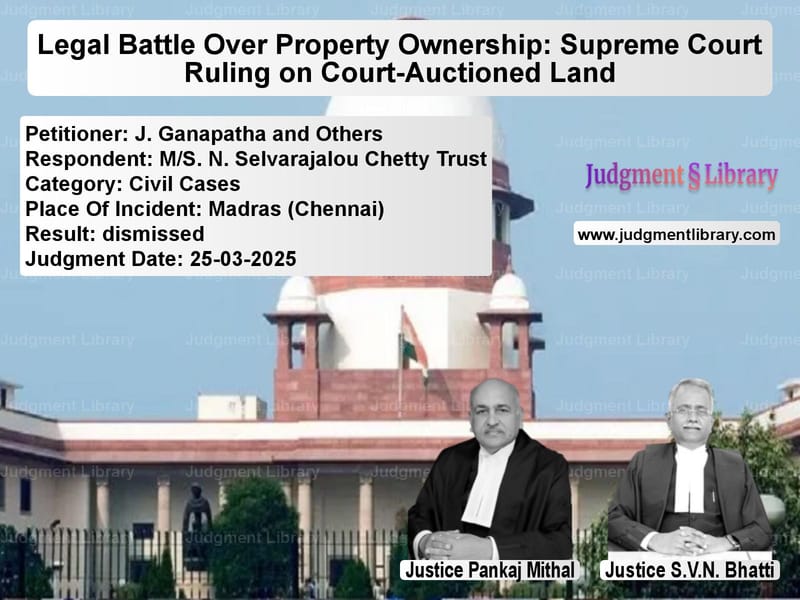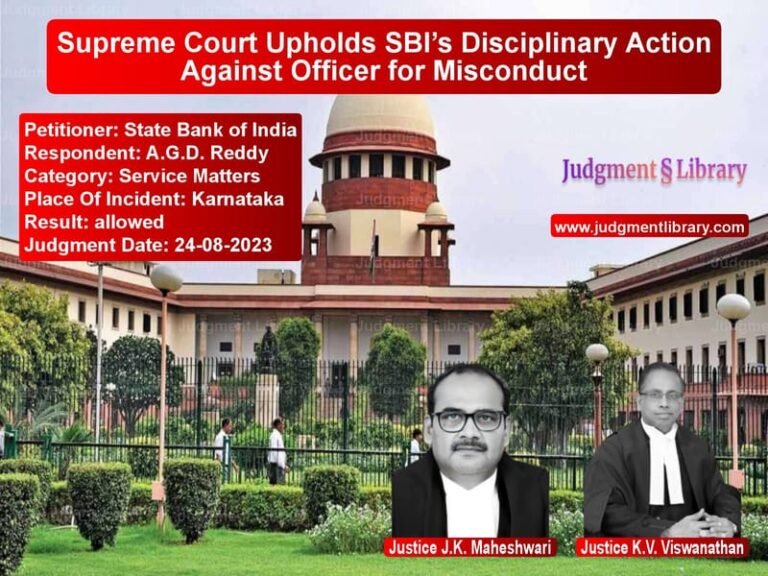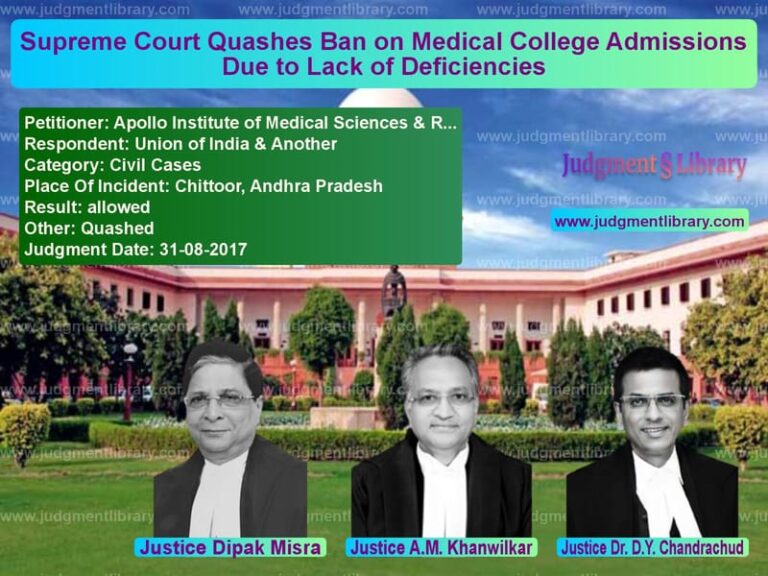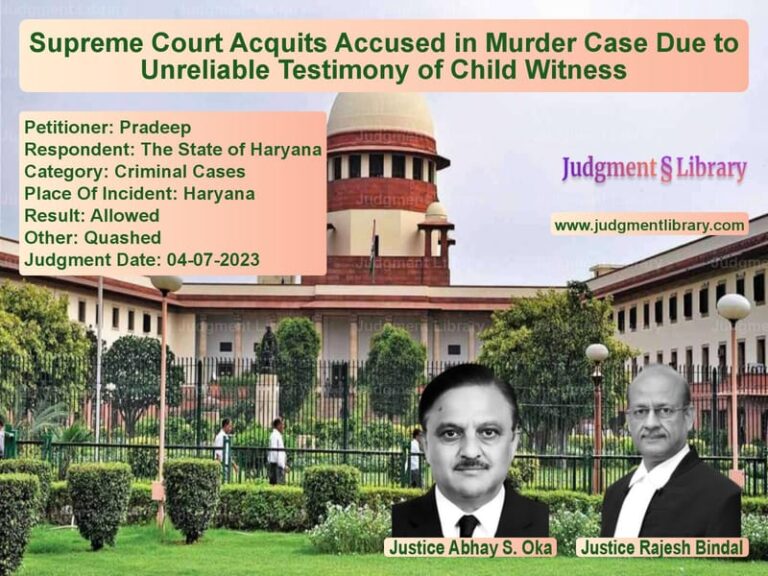Legal Battle Over Property Ownership: Supreme Court Ruling on Court-Auctioned Land
Property disputes in India often involve decades of litigation, conflicting claims, and legal complexities. One such dispute reached the Supreme Court, where the ownership of land that had been auctioned decades ago was contested. The case, involving J. Ganapatha and Others as the appellants and M/S. N. Selvarajalou Chetty Trust as the respondents, raised critical questions about rightful ownership, the validity of past court rulings, and the legal doctrine of molding relief.
Background of the Case
The property in question was initially purchased by Somasundaram Chettiar in 1929. Due to legal and financial complications, the property was later auctioned in 1962 and purchased by Padmini Chandrasekaran. The sale was executed through a court order, and the transfer was formalized in 1963. Despite this, disputes over ownership persisted, leading to multiple rounds of litigation.
Read also: https://judgmentlibrary.com/legal-battle-over-assigned-land-supreme-court-ruling-explained/
The appellants, J. Ganapatha and Others, claimed ownership through subsequent transactions based on a will executed in 1962 by Somasundaram Chettiar, who had originally owned the land. The respondents, representing the trust, argued that the court auction sale was final and legally binding.
Legal Issues Considered
- Whether the will executed by Somasundaram Chettiar in 1962 could override the court auction sale of the property.
- Whether the appellants had any valid claim to ownership after the auction sale had been executed.
- Whether the lower courts were justified in molding relief in favor of the trust.
- The legal standing of the trust as the rightful owner.
Petitioners’ Arguments (J. Ganapatha and Others)
- The appellants argued that the 1962 will of Somasundaram Chettiar conferred ownership rights upon the adopted son and, through subsequent sales, to the appellants.
- They claimed that the court auction sale should not have been executed while a valid will existed.
- The appellants contended that the lower courts had wrongly ruled in favor of the trust and had molded relief unfairly.
The petitioners’ counsel stated: “The sale deeds in favor of the appellants were executed in good faith, based on the will, and the respondents have no standing to challenge them decades later.”
Respondents’ Arguments (M/S. N. Selvarajalou Chetty Trust)
- The respondents argued that the court auction sale had been conducted in accordance with legal procedures and was legally binding.
- They contended that the appellants’ claims were invalid, as the transfer of ownership had already been formalized through the court process.
- They asserted that the molding of relief by the lower courts was necessary to prevent unnecessary litigation and ensure that justice was served.
The respondents’ counsel argued: “The appellants cannot claim ownership over a property that was legally acquired through a court-ordered auction decades ago. The will in question was executed after the auction and cannot override a legally binding sale.”
Supreme Court’s Observations and Ruling
The Supreme Court reviewed the legal documents, past rulings, and the doctrine of molding relief before making the following key observations:
- The court auction sale conducted in 1962 and the subsequent sale deed executed in 1963 were legally valid and final.
- The will executed by Somasundaram Chettiar in 1962 could not override the auction sale, as the property had already been transferred before his death.
- The lower courts had correctly ruled that the appellants had no valid claim to the property.
The Court observed: “The concept of molding relief allows courts to adjust the relief granted to ensure that justice is served and that litigation is not unnecessarily prolonged.”
The Court further ruled: “When multiple legal claims arise, priority must be given to transactions that were executed in accordance with court orders and established legal procedures.”
Final Judgment
The Supreme Court upheld the previous rulings and affirmed that the trust was the rightful owner of the property. The appeal by the appellants was dismissed, and they were ordered to pay costs of ₹1,00,000 to the Legal Aid Services Authority of the Madras High Court.
Impact of the Judgment
This judgment sets an important precedent regarding property ownership and court auction sales. The ruling reinforces the principle that legally executed auctions cannot be challenged arbitrarily, especially after several decades. It also emphasizes the necessity of respecting legal procedures and ensuring clarity in property disputes to avoid prolonged litigation.
The case serves as a reminder that claimants must establish clear legal grounds for ownership and cannot rely on documents that contradict legally sanctioned transactions. Furthermore, the Supreme Court’s decision highlights the role of courts in shaping relief to align with the broader principles of justice.
Petitioner Name: J. Ganapatha and Others.Respondent Name: M/S. N. Selvarajalou Chetty Trust.Judgment By: Justice Pankaj Mithal, Justice S.V.N. Bhatti.Place Of Incident: Madras (Chennai).Judgment Date: 25-03-2025.
Don’t miss out on the full details! Download the complete judgment in PDF format below and gain valuable insights instantly!
Download Judgment: j.-ganapatha-and-oth-vs-ms.-n.-selvarajalou-supreme-court-of-india-judgment-dated-25-03-2025.pdf
Directly Download Judgment: Directly download this Judgment
See all petitions in Property Disputes
See all petitions in Succession and Wills
See all petitions in Specific Performance
See all petitions in Judgment by Pankaj Mithal
See all petitions in Judgment by S.V.N. Bhatti
See all petitions in dismissed
See all petitions in supreme court of India judgments March 2025
See all petitions in 2025 judgments
See all posts in Civil Cases Category
See all allowed petitions in Civil Cases Category
See all Dismissed petitions in Civil Cases Category
See all partially allowed petitions in Civil Cases Category







